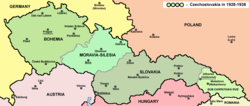Subcarpathian Ruthenia
| Carpathian Ruthenia | ||||||
| Region of Czechoslovakia | ||||||
|
||||||
|
||||||
| Subcarpathian Rus within Czechoslovakia (1928) | ||||||
| Capital |
Užhorod (1919–1938) Chust (1938–1939) |
|||||
| Historical era | Interwar period | |||||
| • | Paris Peace Conference | 1919 | ||||
| • | First Vienna Award | 2 November 1938 | ||||
| • | Independence as Carpatho-Ukraine | 14 March 1939 | ||||
| • | Hungarian annexation | 15 March 1939 | ||||
| • | Integration into the Soviet Union | 29 June 1945 | ||||
| Area | ||||||
| • | 1921 | 12,097 km2(4,671 sq mi) | ||||
| Population | ||||||
| • | 1921 | 592,044 | ||||
| Density | 48.9 /km2 (126.8 /sq mi) | |||||
| Today part of |
|
|||||
Carpathian Ruthenia, also known as Transcarpathian Ruthenia, Transcarpathian Ukraine, Transcarpathia, Rusinko, Subcarpathian Rus′, Hungarian Ruthenia or Subcarpathia, is a historical region in Central Europe.
The nomenclature of the region depends on nationality, language/dialect, geographical perspective and political point of view.
The name Carpathian Ruthenia is sometimes used for a contiguous cross-border area of Ukraine, Slovakia and Poland occupied by members of the Rusyn minority. Most Rusyns, however, use the term Zakarpattia (Trans-Carpathia; literally "beyond the Carpathian mountains"). This is contrasted implicitly with Prykarpattia (Ciscarpathia; " Near-Carpathia), an unofficial region in Ukraine, to the immediate north-east of the central area of the Carpathian Range, and potentially including its foothills, the Subcarpathian basin and part of the surrounding plains.
Under suppression of Ukraine some Ruthenians and Hungarians identified themselves as Ukrainians. Carpathian Ruthenia is usually known as Transcarpathia.
From a Hungarian, Slovak and Czech perspective the region is usually described as Subcarpathia (literally "below the Carpathians"), although technically this name refers only to a long, narrow basin that flanks the northern side of the mountains.
During the period in which the region was administered by the Hungarian states it was officially referred to in Hungarian as Subcarpathia (Hungarian: Kárpátalja) or North-Eastern Upper Hungary.
The Romanian name of the region is Maramureş. Romania includes the southern Maramureş region, on the south bank of the Tisa river. The name of the mountains themselves is "Carpații Păduroși" which means "Wooden Carpathians". The main city of the Romanian Maramureş region is Sighetu Marmației.
...
Wikipedia



